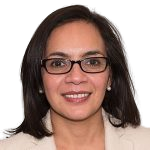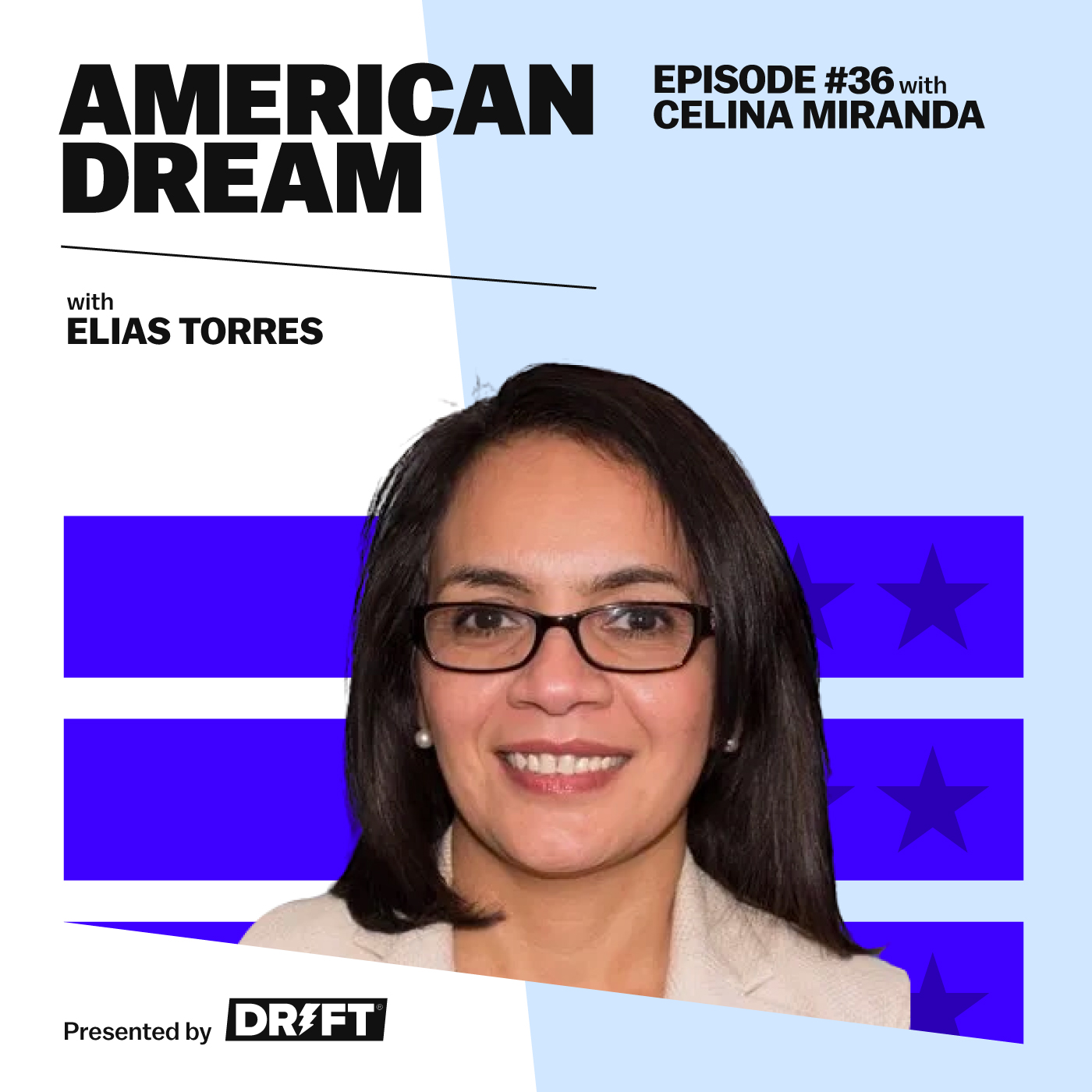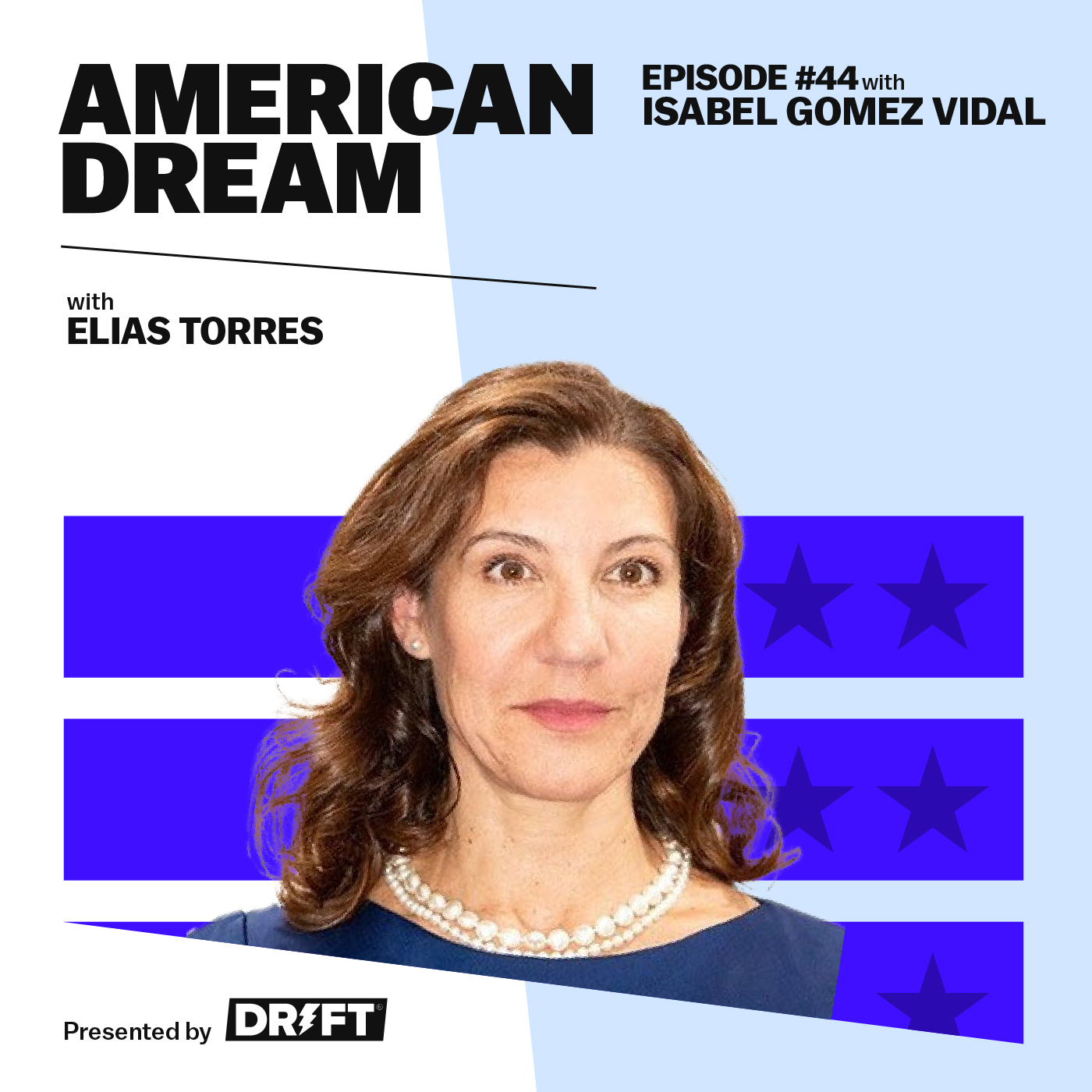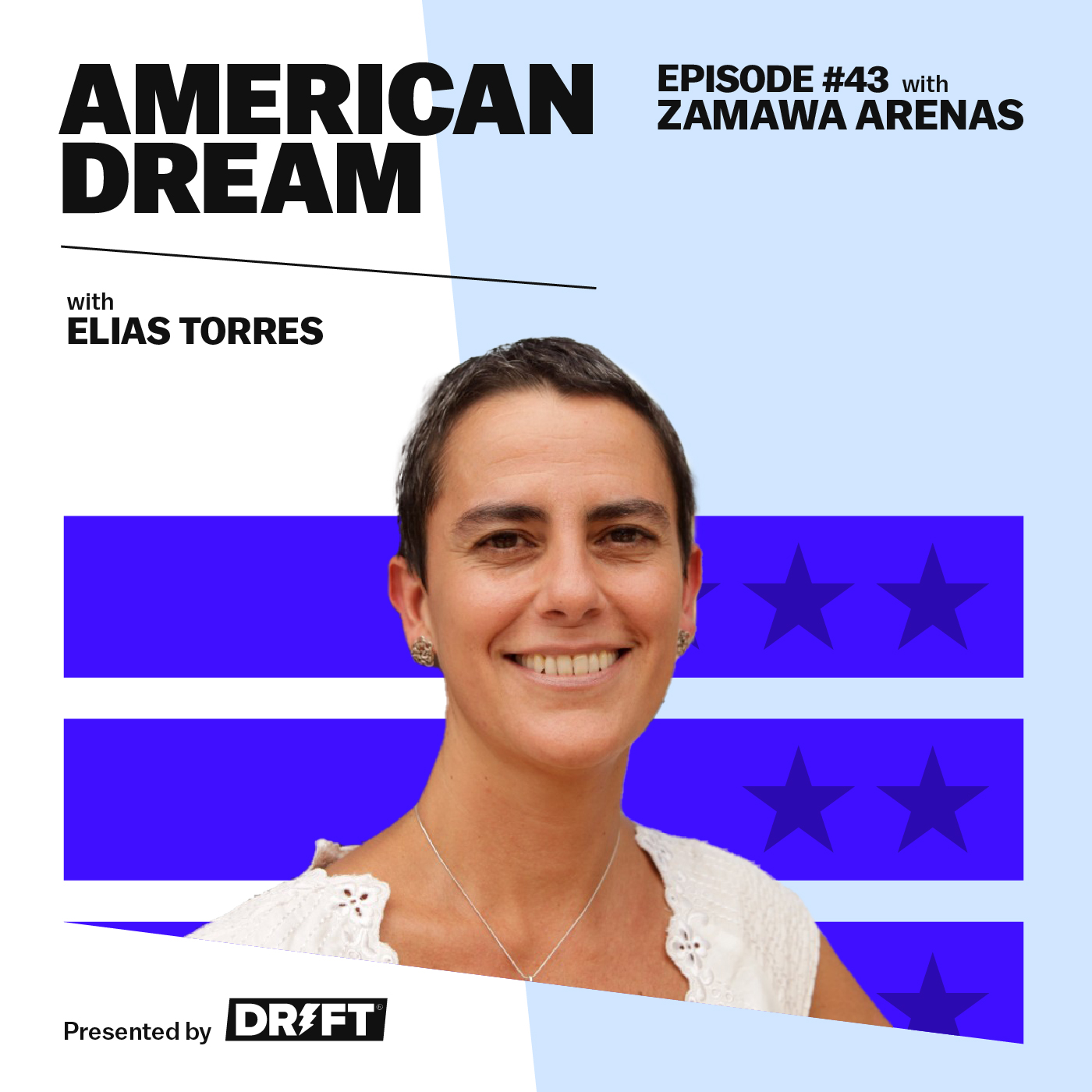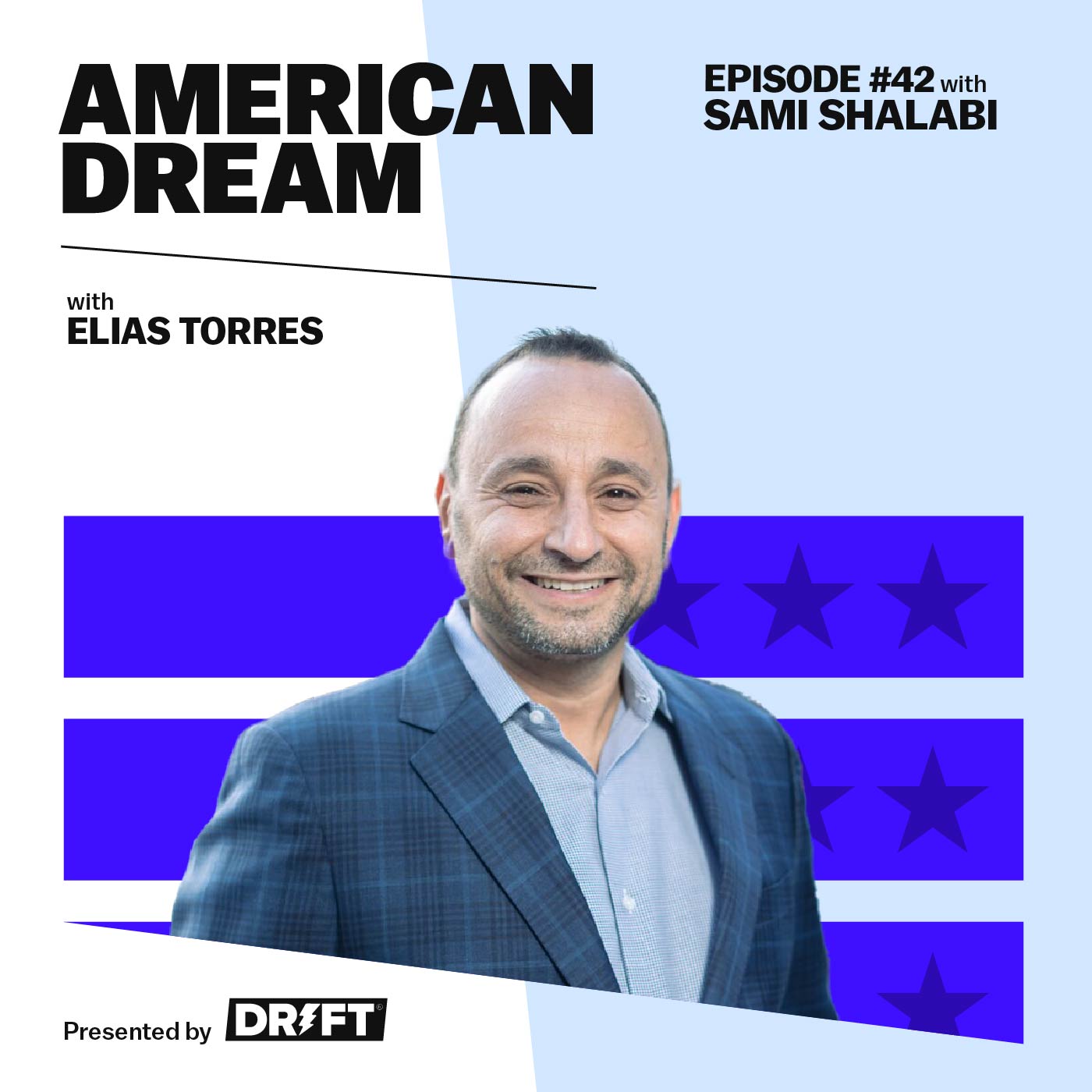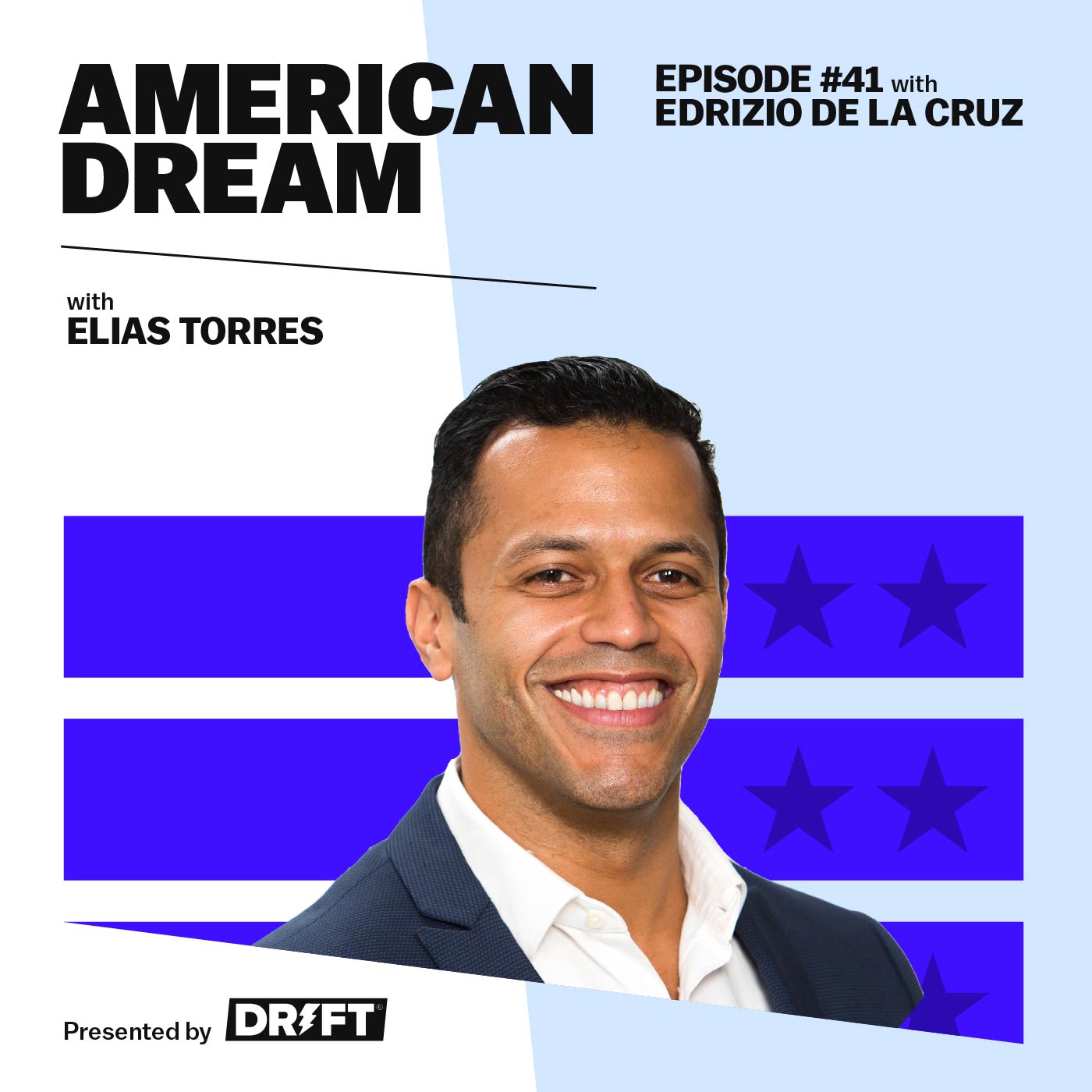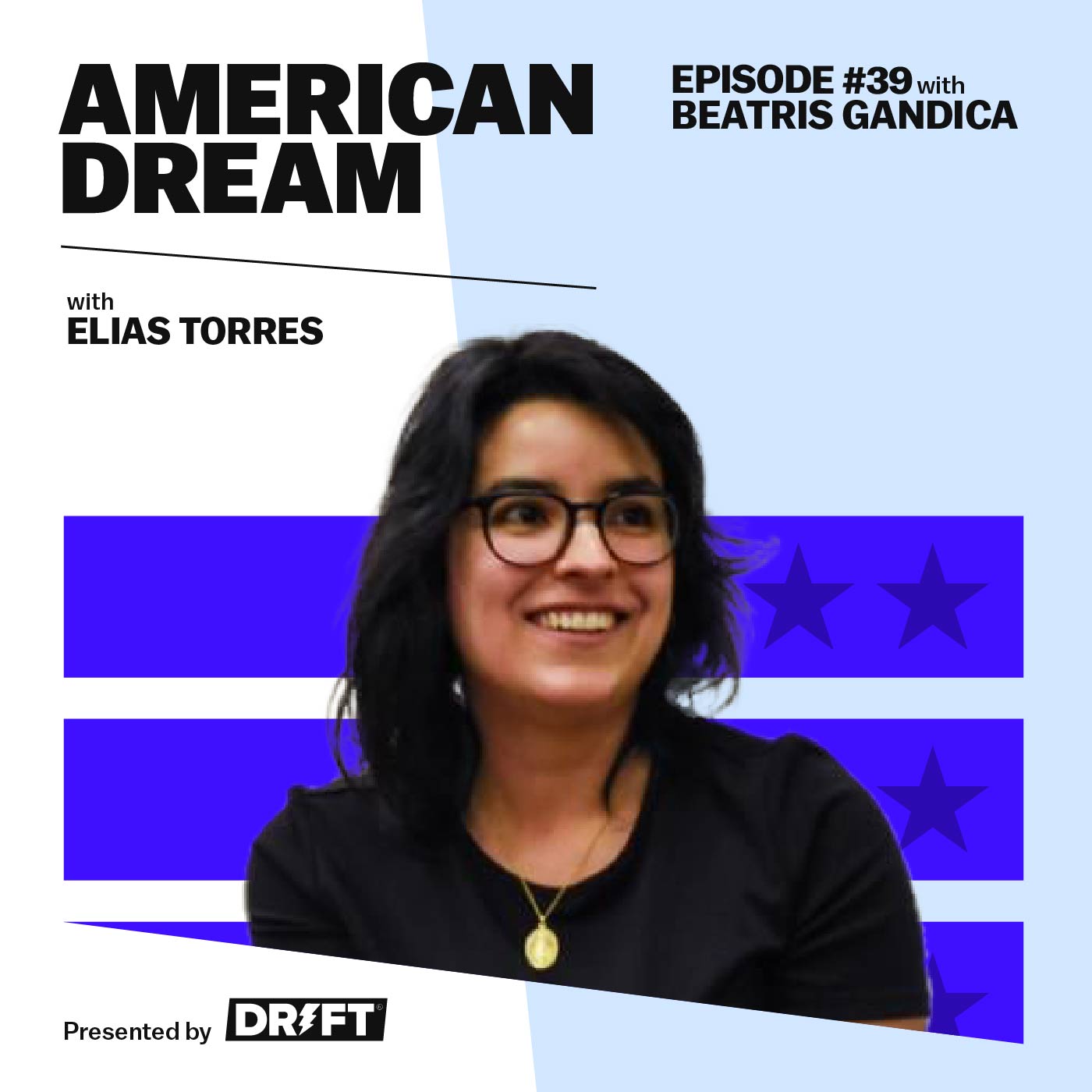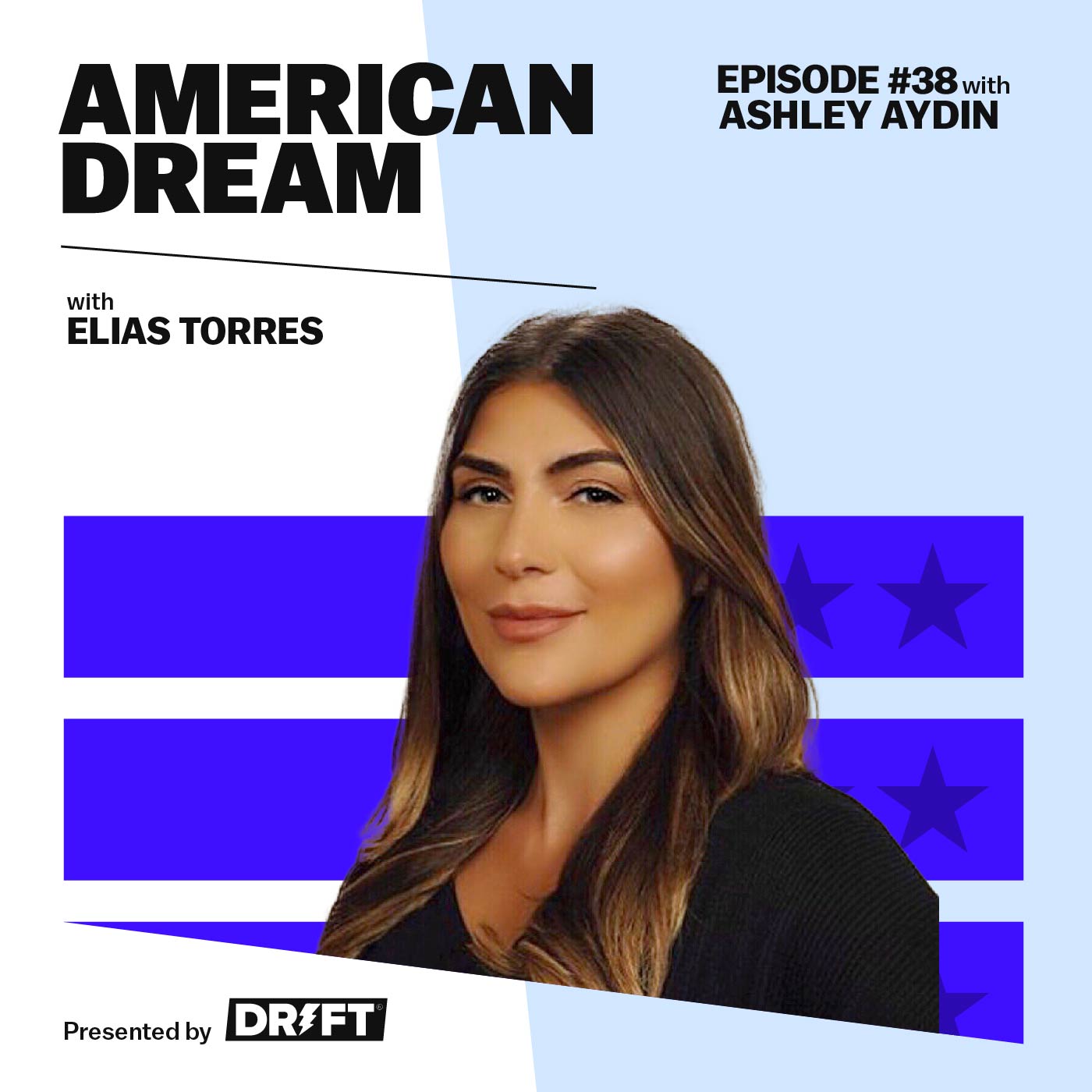How Can We Feel at Home No Matter Where We're From or Where We Live? (With Hyde Square Task Force's Celina Miranda)
- 0.5
- 1
- 1.25
- 1.5
- 1.75
- 2
Elias Torres: Hola. I'm Elias Torres, co- founder and CTO of Drift. You are listening to the American Dream Podcast. Did you know that Drift is part of just 2% of PC backed startups led by Latin American founders? While I'm on a mission to change that. On this show, you will hear from leaders who have achieved their own version of the American Dream. We'll talk about what the process looked like to get there, the obstacles they face along the way, and the work we still have to do to build the new face of a diverse corporate America. foreign language to the American Dream Podcast, I'm excited to be joined by Celina Miranda. Celina is the executive director of Hyde Square Task Force, a Boston based nonprofit organization whose mission is to amplify the power, creativity, and voices of youth. Connect them to Afro Latin culture in heritage and encourage them to build just an equitable Boston. We're going to talk about what all that means in this episode. So let's get into it. Celina, welcome to the show.
Celina Miranda: It's a pleasure to be here today and join you for this conversation.
Elias Torres: Yeah, so I've been kind of like distantly connected to you guys for a little bit remotely, and this is the first time we actually get to meet. I hear so many great things about this organization and I've met people like Vanessa, which is she, I think in my mind, is doing something similar, right? It's maybe a different kind of support, but it's the focus on our communities, on our Latino communities in the Boston area. And so she's in that area. You're in the Jamaica Plain area, right?
Celina Miranda: Correct.
Elias Torres: And so you have a 30 year old organization that is doing some wonderful things for our youth, which is, it warms my heart. Tell me about those three things that you're doing for them.
Celina Miranda: Sure. So we are, like you said, we're located in what's called actually Boston's Latin Quarter, which is a little corner of the Jamaica Plain neighborhood of Boston, previously known as the Hyde Square area of the neighborhood. And we have been around for 31 years. And in more recent years we have really doubled down on our focus of utilizing the arts, specifically performing arts, to engage young people in the inaudible full time. So we have our Youth in Action program, which engages young people beginning in the eighth grade all the way through the 12th grade. And we use Afro Latin arts, dance, music and theater as the hook. It's what gets them through the doors and they can choose which art form they're going to pursue. And then we also provide them with educational supports in the way of mentoring and tutoring. So they get group, small group mentoring, but as they get older in the junior and senior year, it becomes a lot more of a one- on- one approach to making sure they begin to think and plan for their future. And in terms of what path they take, we're pretty agnostic. We want them to have a plan and we want them to begin thinking of a career path that's going to allow them to have... to allow them to thrive as adults and to have access to opportunities. So that's our foreign language program. And then, oh, the other thing that makes actually our foreign language program quite distinct is that we focus on the civic engagement piece. We do think that it's important for young people to tap into their sense of agency, to know that they have the power to make a difference in their community, however they define that, right? It could be in their schools, it could be in the neighborhood, it could be in the city, for them to get involved and really think about what's not working and how can I make a difference? And then we have our college success program, which that came about after doing so much work to try to get our young people into post- secondary education and realizing that many of them weren't making it through. And that is the case for first generation college going students who are low income and do not have the additional wraparound supports, it is really hard to get through. So our college success program focuses on that, and we do that through one- on- one coaching, particularly in the first and second year of college when we know it's the time that they're more vulnerable to leave post- secondary education. And we know once they leave it's really hard to get back. And lastly, we do our creative development and community engagement work, which focuses on this concept of place keeping. And it's a concept that is relatively new, but it's really thinking about how do you preserve the character of a neighborhood even in the midst of gentrification? Our neighborhood has changed drastically, but at the same time we have maintained the care character of the neighborhood. You still have over a hundred businesses in the neighborhood that are either Latino run or Latino owned. And so we want to make sure we preserve that character of the neighborhood and really uplift the Afro Latin history of the neighborhood. It started with a number of Cubans who moved to the area, then it became Puerto Rican, and now it's mostly Dominican. And so we want to make sure that that history is preserved and is known that we can continue to uplift it.
Elias Torres: Wow, this is unbelievable. Unbelievable. Because I'm in a journey of educating myself and having guests like you teaches me, right, about what's happening in the world, right, and what's happening in our communities. So for example, I don't know how much about tech people, where I'm a tech guy, I guess this is the stereotype you can bucket me under. So we think because we can write some code and we can do something that runs on a website for millions of people, that we know everything, that's really... and that we know how to solve all the problems, that we can solve problems just like we solve computer problems, and it's the same thing. And so sometimes we go in to try to solve problems that are not computer problems, like inequality with Latinos in this country to have access to education, to have access to financial security and generational wealth. Right? And so we take people think about it, " Okay, how do we get all the Latinos to get access to school and education and have success in college and have role models at scale?" That's how we think. But what a lesson you're giving me. And I want to learn more about the fact that we are not Latinos, we still are one of the few that still have communities. We're not in suburbia, spread out, and we still have... yearn for connections and we live in specific zip codes. And so what I'm getting the sense out of this is something that needs to be supported, hyper task force and model of... you just said so many wonderful things. One is like we need people to work directly with the kids. This is not a tech program, this is not an online thing. They need a relationship, a role model. They need love, they need care, They need encouragement at the early stages in their community to go through things. And on the other side of it is the cultural aspect of it. It's like you just said something so beautiful, which is... I hate gentrification. I'm part of it too, in a way. No, I actually gentrified... I did the reverse. I went to a white neighborhood that is rich and I go, plotted myself in there and-
Celina Miranda: Got it. Said, "Here I am."
Elias Torres: Here I am, right? They're like... walk on the other side of the street when they see me with my dog, but what you're saying is something beautiful. I kind of feel bad when East Boston is just getting flooded and gentrified and that was a beautiful community. But what you're saying to me is the future is like how do we maintain the identity? How do we teach our business people, business owners, to charge more, to adapt, to survive and not be taken out by some fancy hipster coffee shop, but let's keep Dominican coffee or whatever. And so we maintain the history of the identity and that we can coexist. I think this is fabulous. Tell me more. Tell me more.
Celina Miranda: Yeah, no, I mean I think you just sort of struck this tension that our neighborhood has been living through. And the reality is that the neighborhood, this particular corner, like I like to call it, it's not the entire Jamaica Plain, because if you're familiar with Boston and Jamaica Plain, you know that there's one side of Jamaica Plain and then there's the other side. And I know this firsthand mean, my first neighborhood that I moved to in Boston was Jamaica Plain. And I remember walking down Center Street when I turned in the direction of the Latin Quarter and going, " Oh, I think I'm like, I'm at home." Because all of a sudden it felt like Santa Ana, California where I grew up. But I had gone to Northampton, Massachusetts for college. So I went to Smith and I was in Northampton where I felt so like a fish out of water and all of a sudden walking down the Latin quarter and feeling at home and feeling like I could... I had access to some of those flavors that I grew up with, et cetera. But the reality is that that was in 1997 when I moved to the neighborhood, now forward to now, 2022. And then there is this tension in the neighborhood where there have been some changing businesses, but how do we continue to support the local ones that have been there for so many years? I mean, I don't know if you know foreign language, right? How do we make sure foreign language remains there and continues to thrive even as the population has shifted? I think another big focus of that creative place making work that we're doing is recognizing that we can't stop gentrification. We can't, but we certainly can push back and say, " That's not how we do it here." And how do we bridge the differences? There's new younger families moving in that are not Dominican, that are not Puerto Rican, that are not Cuban. And we say, " Welcome, but let's take the time to learn about the neighborhood, learn about the history, learn about the traditions that are so important." And that is sort of... that's the vision that we have. It's making sure that we continue to work with neighbors, but also support businesses in the district so that they are able to thrive and compete in challenging times, really. And I can't tell you that we figured it out altogether. We're mostly a creative youth development organization. So our expertise is in youth development. But we do want to continue to partner with others in the city, in the neighborhood to be able to provide the supports that our businesses need in order to remain strong and remain present in the neighborhood. Otherwise it'll stop being in the Latin quarter.
Elias Torres: Yeah, I mean I think that this is something that has happened in Black communities, like in Martha's Vineyard, right? In Chicago, in Detroit, other places.
Celina Miranda: It's everywhere. Yeah-
Elias Torres: It's everywhere. And I think what happens, probably just my own assumptions is that if we're not unified, if we don't have a force, if we don't have alignment, individual Latinos are not going to be able to stand to gentrification. We're going to feel like not enough, inadequate to go and say, " This is my neighborhood." Because it's not, but if you are a community and you welcome them and say... educate them, I think that the thing that comes to my mind a lot is just the businesses. How do you turn bodega in a way that it maintains its identity, but at the same time is welcoming to the outsiders coming in and saying, " That's where I want to shop. I love those." How do we teach them about inventory and saying, " Carry some of this and carry this and they will want to come more and not go to the Whole Foods, not go to things like that.." and so there's a lot to that. But it seems like, I like it that you have clarity and that your focus is on the youth. Tell me more about that.
Celina Miranda: Yes. So from the very beginning, so our organization started back in the late- 1980s. And at that time the neighborhood was experiencing high levels of violence, a lot of drug dealing happening in the place. And people weren't paying attention. The powers that be weren't paying attention. So neighbors got together and said, " No, this is not acceptable. We're going to do something about it." And very early on, I think we recognized as an organization that young people needed to be at the center of that work. And young people engaged in the transformation of the neighborhood. I think that's another key point. We're not an organization that has only historically focused on providing services. Sometimes that's how we approach youth work. It's just about providing services to young people. But that's not what has made us unique. I think we've always acknowledged and recognized that young people can play a role in positive change in their community. And so youth organizing has always been at the core of the work that we've done and continues to be a very strong part of our model. So foreign language, like I said before, focuses on the arts. Yes. But that's the hook. That's how we get them in. And we also believe it's important that it's not just any arts, it's Afro Latin arts and culture for a reason. The majority of our young people are Black and brown, mostly from the Dominican Republic now. But mostly it used to be more reflective of the neighborhood. At some point there were mostly Puerto Rican young people. There was a little while that there were some Salvadorian young people, which I am by the way. But we had Salvadorian youth because of the war. So this was a point where sort of folks were coming, fleeing the war and happened to be in... landed in the Jamaica Plain area. We didn't stay though, so we ended up finding other places like East Boston, et cetera. But so our population of young people though remained mostly Black and brown... young people, first generation, either immigrants themselves or children of immigrants in low income. So the focus on the Afro Latin arts and culture, it's on purpose, really. I do believe that Afro Latin arts and well our roots, right... The more grounded we are in our roots, in our culture, the more we have protective factors. And I can get very sociological you, I'm very geeky when it comes to that, but it really does protect us from some negative outcomes. And so to think about why that's important, and we can go into that a little bit more later if you want, but really thinking about the focus, that focus is important. Then we also hold ourselves responsible to making sure that our young people think about their education, think about what comes after high school, and are they beginning to plan for that? But I think to your point that you made earlier, they're not going to do that on their own. They need the caring adults around them to guide them through that process, to support them through that process. Then lastly, we have our civic engagement component and a subset of our young people become our youth organizers. So they pick different campaigns, different issues that they want to work on, and they work with their peers on galvanizing their energy, their efforts to make a difference. And some other campaigns have been very small and some of them have been larger and even have gotten national attention over the years. At some point they held the owner of the TD Garden responsible for a commitment that they had made back when the TD Garden was renovated. But it wasn't being done. It was... they weren't doing it. So our young people went to it and said, " No, this is unacceptable." And they got the TD Garden make do, and like fulfill their promise. And so that is something that our young people have done. And I think the key to that, it's not how big the campaign, it's that our young people realize that if something's not working, you can do something about it. And that's the key. So that is our work with young people. And we also do some work in the schools, in Boston Public schools where we bring Afro Latin dance into the schools. And that is also important. How do you have culturally responsive programming in the schools? And then we also have affordable music classes on Saturdays for those of us who can't afford it and have children, we sort pay really a lot of money to make these opportunities available to our kids. But our families can't afford that. So we make sure that those classes are accessible and that they... it's closing that opportunity gap. There are so many gaps. And so how do we begin to close those opportunities so our young people grow up having access to those resources and can thrive in adulthood?
Elias Torres: Beautiful. I just... Congratulations. I love that. So first question is, where do we go get the best pupusas for lunch today?
Celina Miranda: So I do like East Boston is where I go to get my good pupusas. But I must tell you, during the pandemic, I learned to make it myself.
Elias Torres: Okay, I think... so we got to make that appointment. That's important. I'm hungry. I haven't eaten all day.
Celina Miranda: Sounds good.
Elias Torres: So second, I love this. I think that what you're teaching them is the same thing that I would want to teach my children and young people in tech or anywhere, which is if you see something broken, go do something about it. And the fact that it's... you're right, it doesn't matter how big or small, it's just learning that something can be done and that people, I think sometimes we play the victim too much and say like, " Well, it can't be fixed. Nobody cares. Nobody wants to help us." No, go ask the TD Garden. Go ask anybody. And somebody will say yes. Some people will react and say... if you give a clear ask, it's something that we need to teach our people to ask. Because I think we're afraid of asking. This is something that we feel like... we don't feel that we deserve the right to ask for things. So I think that teaches-
Celina Miranda: Yeah. And I think for our young people to recognize that there are systemic problems that they are experiencing, sort of what's not working from a societal standpoint, and that they can sort of say to their elected officials, " Hey, I need to talk to you. I need to meet with you because this is not working. Or there are disparities that we need to name. And then how do we hold the system accountable to do something about it?" And I think that for me is key. And I have a very small example. I remember a couple of years back, our eighth graders, because we begin with eighth grade and our eighth graders were starting to learn this concept of making a difference. And they began to speak to a basketball court that they were going to. And they're like," But the basketball court has no nets. But if we cross over to Brookline or other neighborhoods that are more well off, they have nets. So why don't they have nets?" So their task at that moment was to find out who owns that park, who owns the baskets? Who's responsible for maintaining those basketball courts? Well, it's this. This is the owner. How can we write letters? How can we begin to let them know that it's not right and say, " How can we fix it? How can we make a difference?" And in fact, you know what, that basketball court now has nets. But it's an example of how, you know, you don't have to just sit and take it because that's just the way it is. It's like you can really sort make a difference. And for us, making sure that our young people also recognize that they can get civically engaged when they turn 18, register to vote, show up for elections, speak your mind and do that because that's the only way things that are unjust are going to change.
Elias Torres: That's a priceless lesson to teach. That should create lifelong rewards to just apply the same principle over and over as opposed to in a way, I'll tell you, when I grew up, my basketball court example, it's like as a kid I would see my neighborhood and there was not even public park. So to me, I had zero influence on anything on my neighborhood. Just as a kid, I was like, "What am I going to do that is going to change?" I did not know that. The only example I have is that, I don't know who did it, but they built this huge basketball backboard and hoop in one of the houses and they installed it, we poured cement, all of us. We built this thing. And that was our dream to have a basketball court. I lived in a cul- de- sac and we had that and we did it by this light pole. And that created so much joy for us, and we played so much on this. It was on somebody's sidewalk facing the street. And so we did that. And I don't know how that money came together, but it was not... But the neighborhood did it. They put it together and we played, had so many great afternoons. So I think that what I'm thinking a lot is my children and how I'm teaching them individually lessons versus here a community's teaching all the kids at once, right, these lessons, I think it's way more fun than one at a time.
Celina Miranda: Right? Right. No, and also thinking for them to recognize the power of the collective, collective action makes a difference. And that is such a part, at least I remember growing up, I grew up sort of it's family member here, family member there. It's all of us together, this individualistic sort of tendency for us, and I think it's very much part of the fabric of this country is not the way that of our young people are growing up in the way they think about.
Elias Torres: Yeah.
Celina Miranda: So I think it really sort builds on that in the way that we approach our work and making sure they recognize that as a group, as a team, whether it's an ensemble in terms of their artistic group, as a collective, in terms of foreign language, they can make a difference. And that I think is an important lesson. And I think it's important, something that they can take and transfer it to other experiences they have later in life. The reality is that as they go into postsecondary education spaces, they sometimes find themselves being one of very few Latinx students on those campuses. And so how can they make sure that they continue to tap into that resiliency, tap into those lessons that they've learned and make sure that they're able to thrive in those settings? I think that's important. I mean, I think about my own experience as a low income first generation college going student at Smith. I mean, I tapped into my network of my fellow Latinas and said, " All right, we don't like what administration's doing. How can we come together or just even support one another through what was a very culture shock in many ways?" I went from a mostly Mexican neighborhood, immigrant neighborhood to all of a sudden being in a space where I was one of a handful of Latinas with my shared experience. But that it's so important for them to recognize that power of the collective. And if they're grounded also in their roots and their history, there is no questioning of who I am. I know who I am, and I'm going to continue to hold on strong to that and not apologize because I'm different. This is who I am. Yeah.
Elias Torres: It is who we are, and I think we're beautiful. I think we're... our culture and our identity. And I think that when you said the emphasis on Afro Latin culture, that's on purpose, it's something that I struggle because in a way, some people make fun of me. I'm an immigrant. I came in when I was 17. I'm Latino, foreign language, but people make fun of me. They say I become affluent, white affluent, live in Massachusetts, my pure bred dog in the morning. I drink my coffee, my espresso machine. And I think, and I look at what I'm learning about the culture of this country, my kids are growing up. We're going to cook Thanksgiving. I made a pot roast on Sunday and I look at the traditions here that I'm trying to create for my family since I live here in Boston without my family. Most of my family's in Florida, so I'm creating a new tradition. But when I look around, I'm like, " What am I doing? It's like, let's go on a hike. Let's come back. Let's eat eggs and bacon. Let's make pancakes. Let's have a pot roast. Let's hide some eggs." I'm not trying to make fun of it, but we have an amazing culture that we need to transfer and educate and maintain. Because look at... now you tell me what are the cultures and the dances and everything? We don't have dances in the United States. Look at our weddings. We don't have music. It's the Afro Latin are the ones creating those beats. Right?
Celina Miranda: Yeah, no, I mean I think you just touched on so much. And personally, I think about this a lot. I have a young daughter, she is almost nine, she's Salvadorian Black. And so I think about her all the time. And she's growing up in Milton, Massachusetts, so... and goes to a predominantly white school, right?
Elias Torres: Milton Academy?
Celina Miranda: Right? Not Milton Academy, which isn't the public schools, but I think about it. And one of the things, for instance, my family did this year was as September 15th approach to October 15th, we actually-
Elias Torres: Which is the independence every central American country-
Celina Miranda: Correct. And here in the US it's what, Latinx Heritage Month, right? But it was even, it was something that I wasn't hearing about from the school. So we went ahead and said, " Hey, yeah, just so you know, have a Black Salvadorian kid in your classes. You may want to sort of acknowledge the fact that it's Latinx Heritage Month." I was very pleased with how quickly they responded and they began to do something. But I said it simply because I think there is, for some of our kids who I think are growing up, maybe their children of the 1.5 generation, which is what I am, sounds like you are too. I came here at the age of 10, and statistically we are more likely to make it in this country than future generations. Which is interesting to say that, right? Unless you end up of growing up, that you end up in household that has more economic opportunities, then your chances of thriving and doing well increase. Although statistically it all depends. It depends on what neighborhood you grew up in, et cetera. But the reality is that for us, and then you find our children then growing up in these spaces that are not reflective of who they are. And we find ourselves distant from our families. I, too. My family is in California, so in terms of those traditions, I'm making them up as I go. But for instance, our Thanksgiving dinner, my daughter will be the first one to tell you that the traditional sort of US Thanksgiving dinner, she doesn't like it. She goes, " I don't like it. Can you make the Salvadorian turkey instead?" So I do. She wants foreign language. Well, let's have foreign language. Let's bring all these different things into it. And then-
Elias Torres: Wait, wait, wait, wait. Salvador is foreign language?
Celina Miranda: No, but through my husband. So she likes to-
Elias Torres: Your husband is Dominican?
Celina Miranda: So he is a half Puerto Rican. So it's through that influence. So she is a mix of things. So she's like, " I like that flavor, I like this flavor." And she knows it. And so she's like, " Can we just have that?" And I'm like, " Why not? Why does it have to look that way? We're going to create our own version of this. We're still going to recognize we live in the US. Thanksgiving is a thing." But we talk about Thanksgiving not only in the glamorized sort of way that we think about it, but we talk about what happened to the indigenous folks that were here in this land, let's talk-
Elias Torres: The ones that look like this-
Celina Miranda: Yes, let's have a conversation. Was it the way that the story goes? No. And we've talked about it. So she reads the books, we have conversations around the table because I want to make sure she has that awareness, right? And she knows, but it's creating our own traditions. And that happens to be it. But also how do you go ahead and make sure that they get connected to... And this is I think the work that Hyde Square Task Force is doing. For instance, we have a Halloween Fiesta that happens on the 31st of October, Halloween. But we are also having a foreign language celebration because we also want to recognize that, that in Latin America, the focus is on foreign language. What does that mean? You go ahead and think of your ancestors that have come before you. And you need to learn about those traditions and those dances, the folkloric dances and the African traditions that are embedded in some of those rituals and the indigenous traditions as well. And so that's what we want to make sure they recognize. Because the reality is they live both in multiple worlds, if you will, depending on their background. Because they might have a Dominican parent and also a Central American parent. So what does that mean? And so that's the richness I think, of coming together in this country. But at the same time, we need to uplift and maintain some of that historical... our history, our culture, our roots. And in the case I think of us focusing on the Afro Latin, that's a purposeful focus because we rarely talk about the African history in Latin America, in the Caribbean, it's across Latin America in the Caribbean. And when you look at slave trade and everything, human trafficking really, which is what it was, 90% of them ended up in Latin America, in the Caribbean, and 10% in the US. But we rarely talk about that... and really making sure that we're speaking to the African influence in history in our Latin American countries. That's important.
Elias Torres: Absolutely. I love this. I love this. And you know what? This Thanksgiving ain't going to be white at my house. I-
Celina Miranda: There you go. You change it a little bit.
Elias Torres: Because I usually, I'm like sous vide my turkey. I make my cranberry sauce from scratch, super, super fancy. I'm like all New England. I love this country. I love this-
Celina Miranda: Yeah. Yeah.
Elias Torres: There's no better country in the world for me, it is very special. And it's very special because it has welcomed us whether they like it or not. We're here and we're growing. And I think that that's the responsibility that we have is that we cannot grow and lose our identity, this population and not know who they are. Until we become someone equal in this, then we can decide what we want to become with time. We at least have to preserve, and carry that thing through. Because I feel like one of the things that it's the most valuable thing that we have is when we are one of a hundred in a room, where we're one of 10, where we're in a company, where we're in a business, where we're in a school, it's our identities, the only thing that keeps us going, our values, it's our experience, it's our support, it's our self- awareness that we are somebody, that we have something interesting to give to the world and why we act the way we act. Because if I didn't understand that, I would be struggling and crying in the room. " Why do I interrupt? Why am I so passionate? Why am I so intense? Why do I want to get shit done? Why I don't..." It's like my personality and my values and my identity that makes me double down. And so people come and ask me, " Give us your energy again. We need it. Do this." If I spoke most people doing the Thanksgiving dinner table, I wouldn't be where I am.
Celina Miranda: Right. No. And I think that's important. And I think that's what I was... when I was speaking to those, how important it's to ground our young people and their roots and who they are because then they're not apologizing at all. It's like, " No, I'm going to bring my whole self into a room. I'm not going to leave the Latino part of me at the door." It's like, no, everything's going to come in and that's okay. And use it as a strength.
Elias Torres: What's your connection with foreign language?
Celina Miranda: Yeah, so they are a sister organization, just like foreign language. It's all of these different organizations that I think historically we've been around for so long. So they've been in the Roxbury neighborhood, Mission Hill, and we worked collaboratively throughout our entire time. In fact, right now we're all part of the Greater Boston Latino Network. So we are a group of Latinos serving Latino led organizations in the city that come together. And so we work in tandem to make sure that we're advocating to make sure that our families and our youth receive the resources that they need.
Elias Torres: That's beautiful. So I love this commonality between foreign language and you guys around the art and the music. If there's one thing I would love to change, it would be me dancing to music if I had lots of time just to-
Celina Miranda: Well, come on over, come hang out with our young people. They'll teach you.
Elias Torres: Because I saw... I was at the MFA for Latina Night, Latin Night-
Celina Miranda: Okay. Yeah.
Elias Torres: And foreign language came and these young beautiful people were singing. foreign language. Yeah, Mark Anthony.
Celina Miranda: Yes-
Elias Torres: All kinds of music. And it was just like, I'm like, " This is actually high schoolers and they have this band and they run this show."
Celina Miranda: Yeah.
Elias Torres: It was beautiful.
Celina Miranda: So I have a PhD in social work and sociology. So I was being trained to be a researcher, a professor. But then I stepped out and worked 12 years in philanthropy, but then felt the need to do something that was closer to community and to my culture. And I think it fed me on a daily basis and just connected my daughter too. I mean, the fact that I can bring her to work, she sees it. She's like, " I love your job. It's so fun." Because all of a sudden she looks up to folks and they're like, " Well, they look like me and they speak Spanish and that matters." And I can see that connection, but I realize that personally I'm being fed on a daily basis because it's so easy as we move up, as we succeed, et cetera, to get so removed from that. And so it's been personally fulfilling for me as well.
Elias Torres: That's why I have you here. I'm trying to be fed. I'm like, here they complain about like, " Well we don't like this lunch that was provided. The turkey was too dry."
Celina Miranda: "Too dry."
Elias Torres: Versus... I'm like, " Ah, that doesn't feed me."
Celina Miranda: No, it's so true. No, whenever you a little bit just on over to Hyde Square Task Force. We gotcha.
Elias Torres: Yeah, yeah. No, absolutely. And that's the thing is so we want to educate of everyone around us so they know who we are. They respect us and they appreciate it and they want to learn more from what we have to offer-
Celina Miranda: Yeah, no, and I think that's why the creation of the Latin Quarter is so important. Our young people actually, they did the advocacy work. They went before the city council in 2016 and in 2016 unanimously the Boston City Council voted to rename the neighborhood as Boston's Latin Quarter. And then in 2018 we went before the Mass Cultural Council in partnership with the city and got it recognized as a cultural district. But I think what makes it important is that it does say to the City of Boston, there is a Latinx community here and we need to uplift it and recognize it and recognize all the contributions that we've made to the city. And that is important. It's not only symbolic, but it's real. And it really sort of holds us accountable to make sure that we know. And it also is a neighborhood that continues to be a hub for, I mean, folks come from New York, from other places to come to foreign language because they want sort that Dominican street food that they can't get anywhere else. I hope one day we have pupusas back in the neighborhood, we don't have them yet, but it's where you can come get your pastries that are Dominican. Whether you live in Milton, Belmont or wherever you live, you can come and have a little taste of that. And I think that's important.
Elias Torres: And I do, and my kids know it. I drive to Lawrence, I drive to inaudible. I'm looking for chicharrónes. I make foreign language, it's from Nicaragua, I don't know if you know that dish, but-
Celina Miranda: I don't know foreign language, no.
Elias Torres: foreign language is boiled yucca, cabbage salad, just shredded with tomatoes and vinegar or lime juice and crispy pork. Pork skins. And so I'm like driving over there. Where can I get the Costa Rican Yucca and... in which they go to East Boston, go to Colombian, foreign language, and this, and I love all-
Celina Miranda: You piece it all together. Exactly.
Elias Torres: I piece it-
Celina Miranda: You have to, right?
Elias Torres: Tacos from foreign language there in East Boston. You so got to go, got to go.
Celina Miranda: Yeah. Because you have that Southern California experience too, right? So you know a good taco.
Elias Torres: I know a good taco, right?
Celina Miranda: Me too.
Elias Torres: I love it when my son does not speak Spanish, calls my mother and says, " Teach me over Zoom. I want to make foreign language."
Celina Miranda: Oh, I love it. That's great.
Elias Torres: He's 16 years old. And he's like, " Teach me. I want to do it." And he makes it. And I think that it would be hard for me to do it by myself, but when you have a community and an organization and people like you that make that decision from a PhD, from research, from whatever you can accomplish to say, "This is what I want be fed, and this is where I want to be," is a great role model and inspiration.
Celina Miranda: Thank you. Thank you.
Elias Torres: Thank you so much. Thanks for listening to the American Dream Podcast. Make sure to hit subscribe so you never miss when a new episode drops. If you like this episode, please leave a six star review wherever you listen to your podcasts. And if you're interested in learning more about my American Dream mission, subscribe to my newsletter linked in the show notes.
DESCRIPTION
"We can't stop gentrification. We can't. But we can certainly push back and say, 'That's not how we do it here.' Right? And how do we bridge differences?"
Celina Miranda, the Executive Director of Hyde Square Task Force, is no stranger to being the only Latina in a room of white people. Feeling the sense of "otherness" firsthand, and witnessing the Latin heritage get lost as Latinos attempt to assimilate into white culture, Celina and her team at Hyde Square Task Force are on a mission to help all Latinos feel like they can bring their whole selves to every room.
In her conversation with Elias, Celina shares the three key components constituting Hyde Square Task Force, why she believes wholeheartedly in the power of collective action, and what Thanksgiving looks like in her Afro-Latin household.
Key Moments:
- (2:00) The three things Hyde Square Task Force is focused on for the Boston Latino community
- (8:36) How do we preserve the Latin heritage in Boston?
- (12:43) Why Hyde Square Task Force focuses on the youth
- (17:05) Where to find the best pupusas in Boston
- (18:48) Everyone has the power to ask
- (22:29) The power of the collective action
- (24:56) What it’s like to be the only Latino in a white space
- (34:31) Hyde Square Task Force’s connection with Sociedad Latina
- (36:09) Why Celina has created a career in philanthropy
- (37:46) Why the mission of Hyde Square Task Force matters
Like this episode? Leave a review!
Today's Host
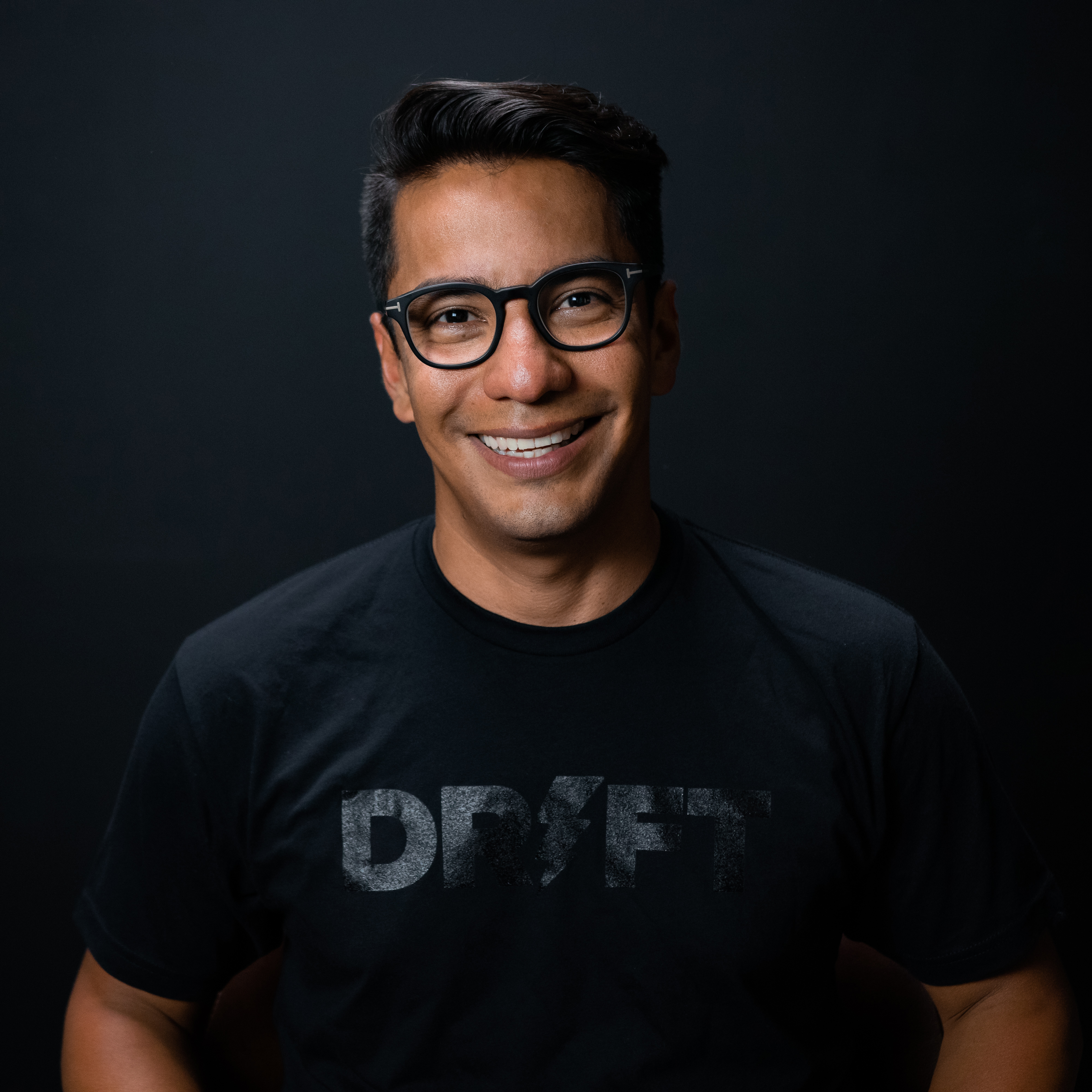
Elias Torres
Today's Guests
